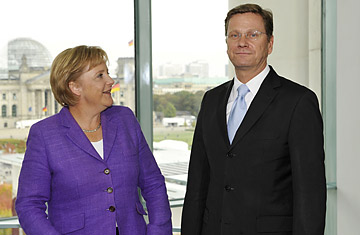
Chancellor Merkel (left) meets with Free Democratic party (FDP) leader Guido Westerwelle at the Chancellery.
Angela Merkel has built a career on defying her critics. On Sunday, she did it again, leading the Christian Democrats to a victory that sets her party up as the head of a new center-right government. But the CDU's probable coalition partner, the pro-business, liberal Free Democratic Party (FDP), could end up being a thorn in her side, especially if, as is likely, the smaller party pushes a reform agenda that challenges Merkel's slow and steady style.
The FDP scored its best ever result in Sunday's election, winning 15% of the vote; after 11 years in opposition, the party is finally back in government. "We will now co-govern Germany," Guido Westerwelle, the leader of the FDP, told a crowd of supporters at an election night rally in Berlin on Sunday. "We want a fair tax system, better education opportunities and we want to ensure that citizens' rights are respected," he said.
During the campaign, Westerwelle pledged to cut taxes and simplify Germany's tax code — regarded as one of the most convoluted in Europe. The FDP leader says the goal is simple: more money in the pockets of workers. Lower taxes, the party says, will increase tax revenues by providing more incentive to work and boosting growth. Pushed by the CDU's sister party, the Christian Social Union (CSU), Merkel has already promised to cut taxes, but she cleverly avoided mentioning any date. The issue is likely to define the new government — either because Merkel and company carry out reforms and remake many of the German economy's pillars, or because the coalition partners squabble over how much they should do.
There's also the matter of the economic downturn. The worst recession since World War II will see Europe's biggest economy contract by 5% in 2009. While Germany's economy grew 0.3% in the second quarter of this year, it will still be a slow climb out of recession. Unemployment is set to rise next year once government subsidized short-term labor contracts are phased out. The budget deficit is expected to pass 6% of GDP in 2010, thanks mostly to a dip in tax revenues. Some economists say the center-right government will be penned in. "There's no room for maneuver on tax cuts," says Professor Henrik Enderlein, from Berlin's Hertie School of Governance. "On the contrary, Merkel's new center-right government is likely to raise taxes, like VAT, in order to get Germany's public finances out of the red."
That won't please business leaders, who have welcomed the prospect of a new direction. "We want to work with the new government to make sure there's economic growth," said Hans-Peter Keitel, the President of the Federation of German Industries (BDI). That enthusiasm will disappear quickly should Merkel shy away from change. "I hope the new government will be good for business as Germany needs structural reforms," Volker Treier, the chief economist of the Association of German Chambers of Industry and Commerce told TIME. "We need a more flexible labor market, reforms of the social security system and urgent reforms of corporate tax." If Merkel decides to push through reforms, it's bound to put her on a collision course with opposition parties, like the Social Democrats and the ex-communist Left Party, and Germany's powerful trade unions. "There's a wall of political opposition and Germans aren't keen on reform," says Treier.
It's unlikely Westerwelle will be in the mood for too many compromises. The FDP leader, tipped to become Germany's new foreign minister, criticized the previous government for bailing out the automaker Opel, while neglecting small and medium-sized firms — the famed "Mittelstand" which make up the backbone of the German economy. Westerwelle also called for controversial reforms to make it easier for firms to hire and fire workers and he proposed 400 spending cuts. That could lead to clashes with Merkel, who's spent the past few years defending Germany's social and labor protections. "I think Chancellor Merkel will continue to be middle of the road to appease the Social Democrats," Gustav Horn, the director of the Macroeconomic Policy Institute in Düsseldorf told TIME. "Labor market reforms are still very unpopular in Germany and they're not necessary because the German labor market has proved to be very flexible in recent years."
In claiming victory, Merkel said she wanted to be a "Chancellor for all Germans, so Germany does better, particularly in a crisis." Most commentators have interpreted that statement as a signal to the FDP that it's the CDU who will make the big decisions. Merkel says her top priority will be to create jobs and get the economy back on track. The question of how that's best done is likely to define the new government.
